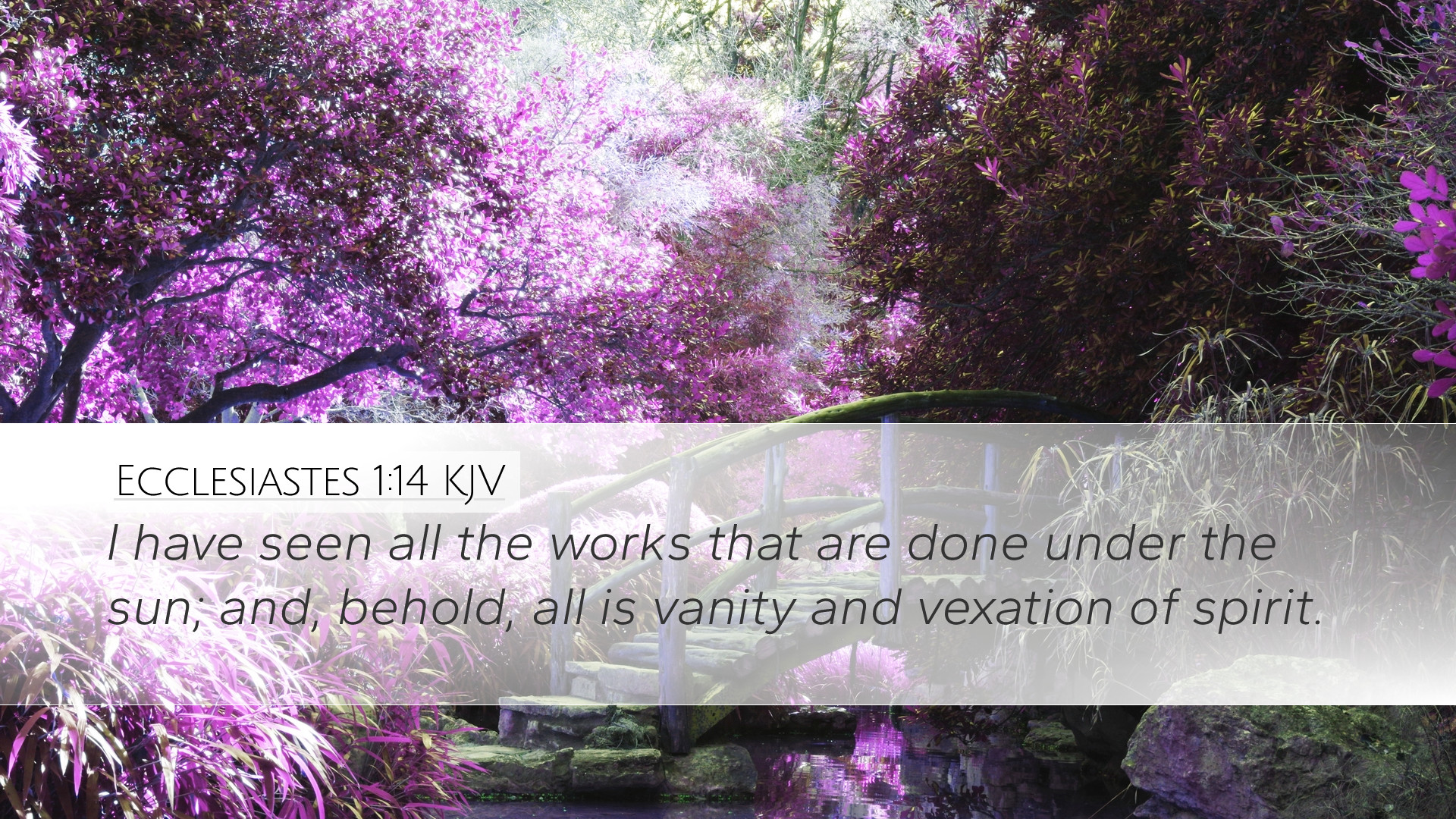Ecclesiastes 1:14 - Bible Commentary
Verse: "I have seen all the works that are done under the sun; and, behold, all is vanity and vexation of spirit."
Introduction
The book of Ecclesiastes reflects the deep philosophical inquiries of Qoheleth (the Preacher), who examines the meaning and purpose of life from a unique perspective. Ecclesiastes 1:14 succinctly encapsulates the melancholy tone of the book, asserting the fleeting nature of human endeavors. This verse acts as a pivotal point, inviting reflection on the futility often encountered in worldly pursuits.
Exegesis of Ecclesiastes 1:14
In this verse, the Preacher presents a stark observation of life and its pursuits, characterized by the dual phrases "vanity" and "vexation of spirit." Each term packs profound theological and existential implications.
“I have seen all the works that are done under the sun”
The phrase "under the sun" is significant as it anchors all observations to the earthly realm. Matthew Henry emphasizes that this perspective limits the view to temporal experiences, as if to say, “in this life alone.” The Preacher, therefore, attempts to grasp reality solely within the confines of human existence and observation.
“and, behold, all is vanity”
The term "vanity" (Hebrew: הָבֶל, hebel) conveys the idea of something transient, insubstantial, and without lasting value. Albert Barnes notes that this conveys a sense of emptiness—much like "a breath" or "vapor." This insight urges believers to recognize the ephemeral nature of material pursuits and earthly gains, reminding us that they ultimately lack eternal significance.
“and vexation of spirit”
The second phrase, "vexation of spirit," suggests a sense of dissatisfaction, frustration, and even torment associated with human endeavors. Adam Clarke elaborates by indicating that this reflects the weariness and turmoil derived from chasing after things that do not yield true fulfillment. The pursuit of worldly acclaim or riches is ultimately a source of anguish, as they leave the seeker unfulfilled.
Thematic Insights
Several key themes emerge from this verse, contributing to the overall message of Ecclesiastes.
- The Futility of Human Endeavor: The recurring motif of futility is central to the Preacher's discourse. The incessant cycles of life—birth, work, and death—are depicted as fruitless without an eternal perspective.
- The Search for Meaning: The existential angst that Qoheleth experiences mirrors the questions many wrestle with today. What is the purpose of our work? What can truly satisfy the human spirit?
- Temporal vs. Eternal: The sharp contrast between the fleeting nature of earthly things and the eternal significance of God's kingdom is foundational. It calls individuals to seek that which endures.
Pastoral Applications
For pastors and church leaders, this verse serves as a sobering reminder of the need for holistic ministry that prioritizes eternal values over temporal success. Consider the following applications:
- Encourage Congregants: When discussing life’s struggles, remind your congregation that it is natural to feel disillusioned with worldly pursuits. Offer hope in Jesus Christ, who provides lasting fulfillment.
- Promote Reflection: Encourage routine reflection on daily activities. What are the motives behind one’s work? Is it to gain pleasure, status, or true purpose?
- Emphasize Kingdom Work: Urge the church to engage in ministry that reflects eternal values—serving the community, evangelism, and discipleship—over pursuits that align with societal measures of success.
Scholarly Reflections
Theologically, Ecclesiastes 1:14 poses critical questions for scholars and students of Scripture:
- Relationship with God: How does this passage shape our understanding of God’s intention for humanity? Can one find satisfaction only in relationship with Him?
- Eschatological Implications: What does the notion of "vanity" signify in the light of Christ’s redemptive work and the hope of the resurrection?
- Wisdom Literature Context: How does this verse compare with other wisdom literature in the Bible? What unique insights does Ecclesiastes offer in contrast to Proverbs?
Conclusion
In summary, Ecclesiastes 1:14 expresses a profound existential assertion that resonates throughout human history and into the present. It challenges believers to confront the reality of human limitations and the transitory nature of earthly pursuits. As systematic theological perspectives consider the nature of fulfillment, this verse consistently encourages reliance on divine wisdom and eternal truths rather than temporal gains.
Ultimately, the call is not merely to despair over life's seeming futility but to seek a deeper relationship with God, acknowledging that true meaning and purpose are found in Him alone.


